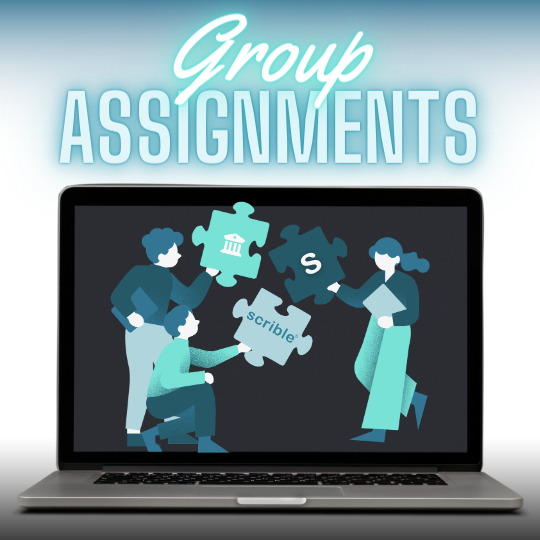
At Scrible, we believe that collaborative learning fosters more profound understanding, creative outcomes, and numerous additional benefits. That’s why we’re thrilled to spotlight one of our most exciting features: Group Assignments.
Elevate your research skills and streamline your workflow with Scrible’s robust and collaborative tools. With Scrible, you can collaborate with your team and seamlessly organize your research notes, citations, and sources. Say goodbye to the chaos of manual note-taking and hello to a streamlined and efficient research process. Whether you’re a student, researcher, or professional, Scrible’s powerful tools will transform your research game and help you achieve success.
The Power of Collaborative Learning
Recent studies shed light on the multifaceted advantages of collaborative learning:
Enhanced Academic Motivation: Collaborative learning methods have significantly boosted academic motivation among students (Loes, 2022)1. When students work together, they become more invested in learning, leading to heightened enthusiasm and engagement.
Active collaborative learning significantly impacts student engagement: A recent study states (Qureshi et al., 2021) that active learning involves students participating in discussions, making presentations, and gaining real-world experiences. Studies show that students learn better when they actively think and engage in their learning. This kind of learning also makes students more involved in their classes, committed to their education, and less likely to drop out. It creates a competitive learning environment. Active collaborative learning is a motivating method that gets students actively involved in learning. It means students work together to achieve different levels of performance.2
Improved Academic Writing Skills: Incorporating online collaboration tools into learning has positively affected students’ academic writing skills (Li & Mak, 2022)3. The interactive nature of such tools allows for instant feedback and collective problem-solving, leading to refined writing techniques.
How Does It Work?
Creating Group Assignments: Teachers can easily create group assignments and select members for each group. This allows for structured collaboration while ensuring each student plays a role.
Shared Libraries: Every group assignment comes with a shared library. This hub allows students to add, annotate, and discuss sources collaboratively. It’s a dynamic space where the research process becomes interactive.
Shared Annotations & Notes: Group members can see each other’s annotations and notes in real time. This fosters immediate discussion, clarification, and integration of different viewpoints.
Individual Accountability: Even within group assignments, individual contributions are tracked. This ensures that every student actively participates and contributes to the group’s success.
The Benefits
- Enhanced Critical Thinking: When students work together, they challenge each other’s ideas, leading to deeper understanding and better research outcomes.
- Improved Communication Skills: Collaborating in a digital space requires clear communication. Students learn to express their ideas succinctly and effectively.
- Responsibility & Accountability: With individual contributions being tracked, students learn the importance of responsibility in a group setting.
Get Started!
Group assignments are a transformative feature that can elevate students’ research and writing process. If you’re a teacher looking to enhance collaborative learning in your classroom, get started with Scrible’s group assignments today!
Join the revolution in collaborative learning. Dive into Scrible, and let’s make research and writing a collaborative adventure!
- Loes, C. N. (2022). The Effect of Collaborative Learning on Academic Motivation. Teaching and Learning Inquiry, 10. https://doi.org/10.20343/teachlearninqu.10.4 ↩︎
- Muhammad Asif Qureshi, Asadullah Khaskheli, Jawaid Ahmed Qureshi,
Syed Ali Raza & Sara Qamar Yousufi (2021): Factors affecting students’ learning performance
through collaborative learning and engagement, Interactive Learning Environments, DOI:
10.1080/10494820.2021.1884886 ↩︎ - Li, J., & Mak, L. (2022). The effects of using an online collaboration tool on college students’ learning of academic writing skills. System, 105, 102712. https://doi.org/10.1016/j.system.2021.102712 ↩︎




